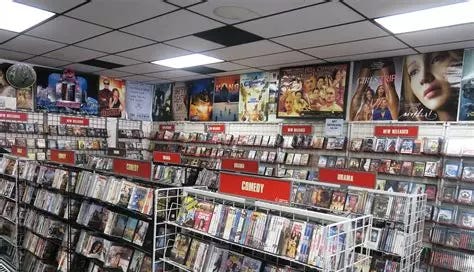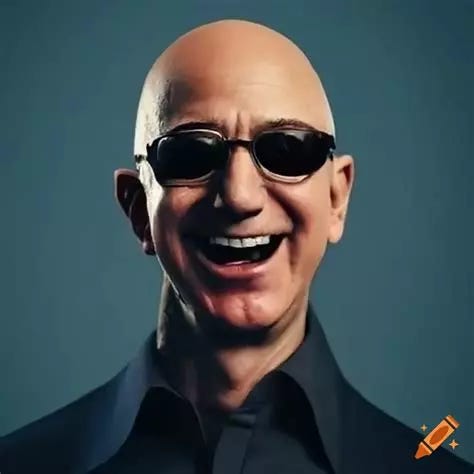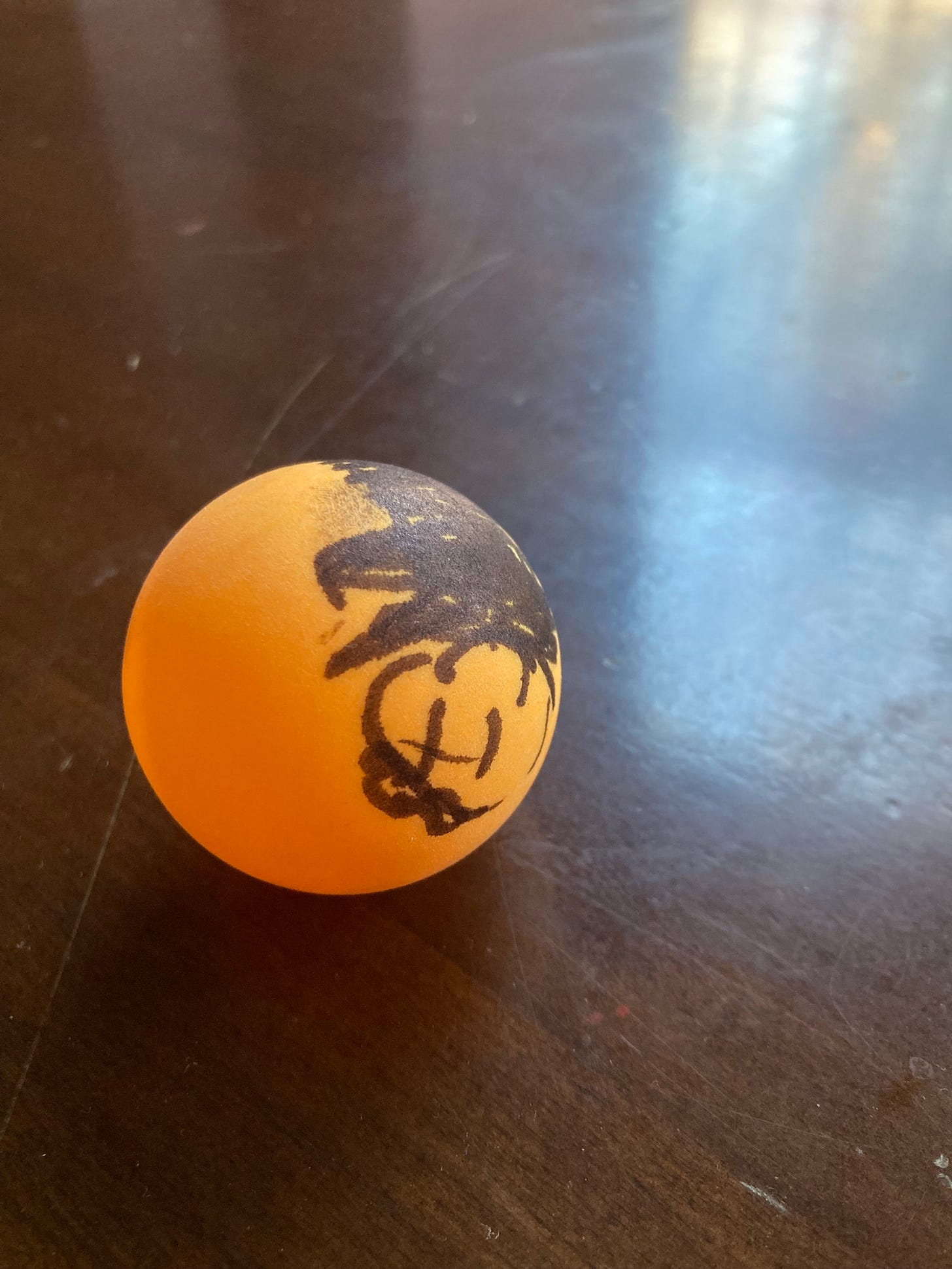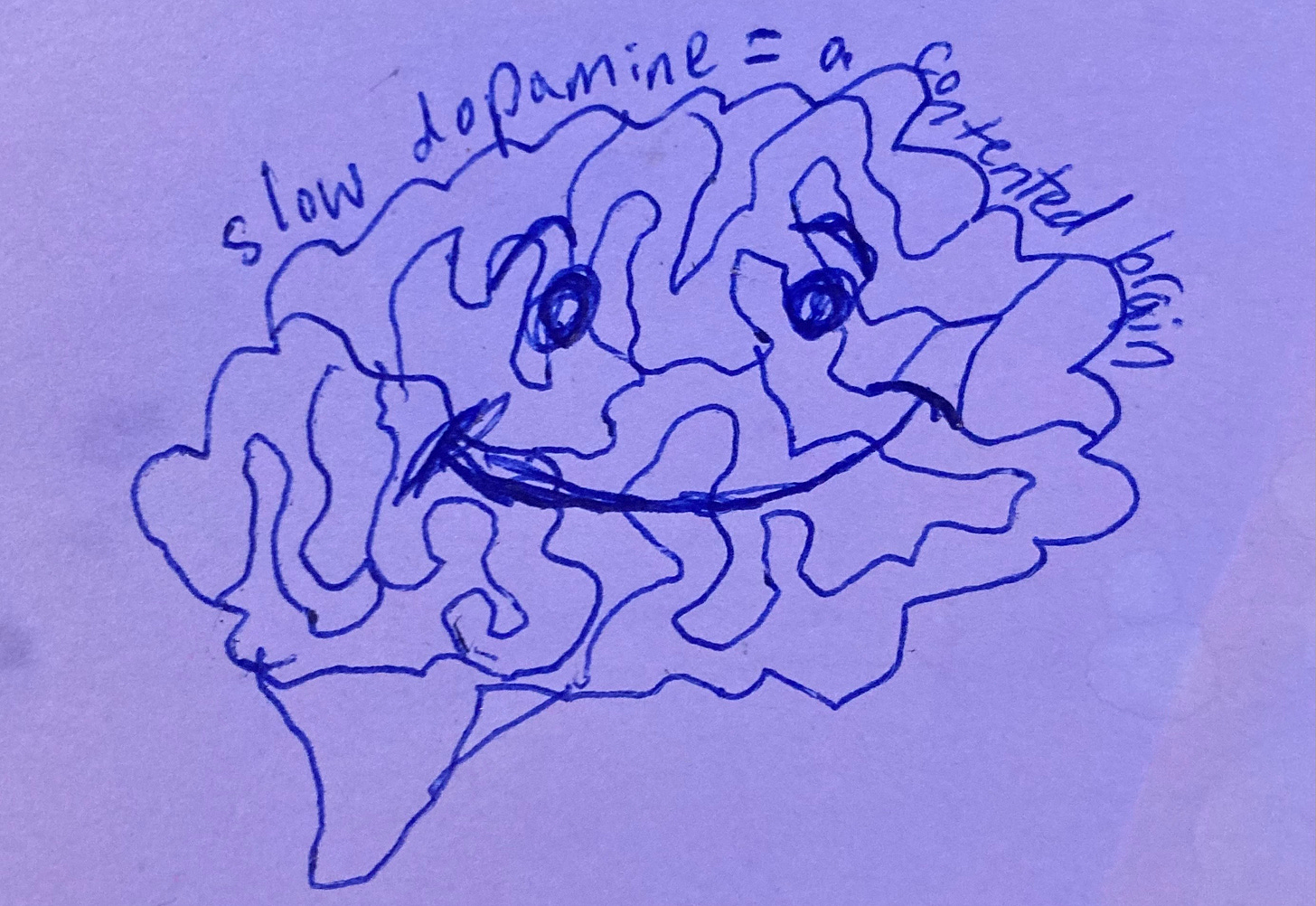Let's keep leaving the house to do stuff.
On video-stores, ping-pong balls, and the underrated beauty of a schlep.
If you’ve gone anywhere near Instagram the past week, then you’re likely aware of today’s Buy Nothing boycott, with a specific focus on Amazon, Walmart, Best Buy, and Target and the caveat that, should you need to buy something, it should be in person from a local small business.
I am in full support of this and am taking part, and I hope you are too. We American consumers have a lot of power, and it’s important to start getting in the habit of using this power to, say, make corporations think twice about submitting to our government as it is destroying so much of what has allowed us to have a stable and functioning society for decades.
But I also think this boycott should be the start of a radical re-alignment of how we are operating as human beings in the world. Let’s be honest, we’ve known many of these corporations to be problematic for a very long time now. It’s not like Amazon was a perfect company until last month when Jeff Bezos decided to put on a pair of “cool” sunglasses and bow down to our president with a smile.
No, my friends. There’s a reason Shop Local has been featured on tote bags since at least 2010.
There’s a slow, insidious shift that’s been happening under our noses, and it’s been so massive and gradual and interconnected that it’s hard to fully process. But, if I had to ridiculously attempt to sum it up in a bite-size concept, I would say this:
We’ve been made to believe that, in all situations, More Convenient = Better, and that’s led us down a road that has slowly chipped away at some of the most vital and wonderful parts of being a human being.
Writer Derek Thompson was on Fresh Air last month, talking with Tonya Mosley about a piece he wrote for the Atlantic called The Anti-Social Century. It’s about the ways community and connection have steadily corroded within American culture since the introduction of the smartphone and, really, since the intro of the television.
At one point, Mosley and Thompson talk about a Tik-Tok trend amongst Gen Z of filming themselves doing a dance when plans get canceled. We can, of course, all relate to the joy of a canceled plan, but they say that, when seen as a collective movement, it feels pretty dark.
I AGREE.
Thompson goes on to explain that, so often these days, we turn to our phones during our downtime, but the phones are so inherently enervating that they sap us, and then the idea of going to hang out with people feels exhausting.
He says we are all “donating our dopamine to our phones,” and then we don’t have anything left to motivate us out the door to see people.
I can’t stop thinking about this.
Donating our dopamine to our phones instead of our friends.
Though I don’t think this exact analysis applies to everyone—as a harried parent of two school-aged kids, my relief at canceled plans is not strictly because of my dopamine donations—I do think there’s something profound here.
This idea that these phones, often by promoting the illusion that we’re connecting with people, are actually keeping us from being with other people is very chilling.
There’s no profit incentive for social media apps to get people together in real life! Then we wouldn’t be scrolling anymore!
And, of course, once we humans have skipped the real-life plans, we’re home, feeling an itch of loneliness that can only be solved by…buying something! And look, it’s so easy!
Just a click away.
These apps and corporations have made it so convenient to isolate ourselves, to cut off human interactions, be it with a good friend or with the supermarket check-out person, that we’ve unwittingly made life feel…less good for ourselves.
Do you remember video stores? I think about them a lot. I loved video stores. I miss them.
For any of you reading this who are too young to have experienced them, just imagine a bookstore, but for movies.
And what I loved about video stores was that they made the act of choosing a movie to watch into an event. You had to physically go to a place, and spend time in that place, and see a wall of choices, and pick up those choices, and hold them, and read about them and decide on one.
And, boy did I take my sweet time. (Sorry, Mom and Dad. Thanks for your patience.)
Was it less convenient than scrolling through options on a screen in your home? Of course it was. But did it get that slow dopamine going in the best way possible?
Absolutely.
When you have to physically transport yourself to a space, there’s a level of gratification and accomplishment that you’ll never get from scrolling through a bunch of thumbnails.
This is partially due to the fact that video stores added genuine stakes to your decision. This choice was going to dictate the course of your evening. If you started watching and didn’t like it, you weren’t going to be able to go back to the video store and choose something else. You’d have to just watch it anyway! Or hope that some good alternative happened to be on TV.
It’s not like today, when my kids are able to stop a movie or an episode four minutes in because they’re not feeling it. I don’t blame them—there are about eight thousand options at their fingertips at any given moment!
I’ve never felt older in my life than when I explained to my kids that, when I was younger, I didn’t have every season of The Simpsons at my disposal and that I literally went from my NJ suburb into NYC specifically to rewatch an episode I loved at the Museum of TV and Radio (now The Paley Center for Media). This really happened. I got set up at a cubicle and finally got to rewatch Season 8, Episode 24—“The Simpsons Spin-Off Showcase”—and it was absolutely glorious. My buddy Zack knows what I’m talking about.
But my kids can barely comprehend it! For them, any episode they want is just a scroll and a tap away. To travel to another city to see an episode of television sounds insane.
That sense of achievement, though, when you have to physically go somewhere to acquire something you want, is part of what helps to give life meaning. You leave your home, and you never know what might happen! Maybe some wonderful run-in, or an awkward one, or an awful one, but that, to me, is what life is meant to be.
It’s why Katie and I love living in a city so much. You can walk to get most things you need. And when you ride the subway, you are forced into communion with whoever else is on the train. Sure, this can be annoying sometimes, and ever-so-occasionally scary, but most of the time it’s everything the online world is not, a refreshing reminder of our common humanity.
Earlier this week, I was with our 7-year-old at his track class at the Y. After the class, he and his friend were picking up stray ping-pong balls near the ping-pong tables. My son wanted to keep one to use as some kind of tiny house or weapon or something, I’m not really sure. Like the total buzzkill Dad I often am, I explained he couldn’t steal ping-pong balls from the Y.
As we walked home, my son was still talking about it. We were passing one of our many local delis, so I said, “Hey, actually, let’s see if they have ping-pong balls here.” “Here?” he asked. “Yeah,” I said. “They might.” I thought it was unlikely but worth a shot.
“By any chance do you have ping-pong balls?” I asked the man behind the counter.
“We do,” the man said with a grin, pointing up. He then proceeded to take out one of those huge-claw things and gesture nearly to the ceiling, where bags of ping-pong balls, white and orange, were hanging from hooks.
My son was ecstatic. He chose orange.
Now, would my son have been equally ecstatic if an Amazon box arrived at our door the next day with orange ping-pong balls inside? Sure.
But there was something magical about going into a local business, where the man behind the counter instantly knew where the item we wanted was. And he gave it to us with a claw.
Which is all to say that: there is joy and beauty in the schlep. We have been trained to believe that, because technology exists to take short-cuts all the time, we should always use it. Can it be helpful sometimes? Of course! Has it created opportunities for people with disabilities or those living in remote rural areas? Undoubtedly.
But that doesn’t mean it has to be the default for all of us in every situation. Taking short-cuts all the time takes a lot of fun out of the journey. It eliminates unpredictability. It eliminates small events that could be happening in your life on a daily basis. And, let’s be honest, these tech short-cuts regularly eliminate small, locally-owned businesses that can’t compete with big corporations’ prices and convenience. Thus, our communities suffer, and we isolate further, and the cycle continues to degrade.
So, on this Buy Nothing day, I encourage all of us to get back into a video-store mentality. Find moments to resist the convenience. Find moments to donate dopamine to friends instead of your phone. Find moments to embrace the schlep.
Your brain and your body will thank you. And I will too.









I watched so many weird little movies in the 90s because that’s what the neighborhood store had and that’s what I chose and that was my sole option, and I watched with my whole brain.I’ve honestly been thinking about killing my streaming subs because the commitment of a single rental, even online, demands a different kind of attention.
Video stores were the best. Nothing better than picking out a video to watch that night.
And I was able to work on my patience, also. Thank you, Lancer! XOXO